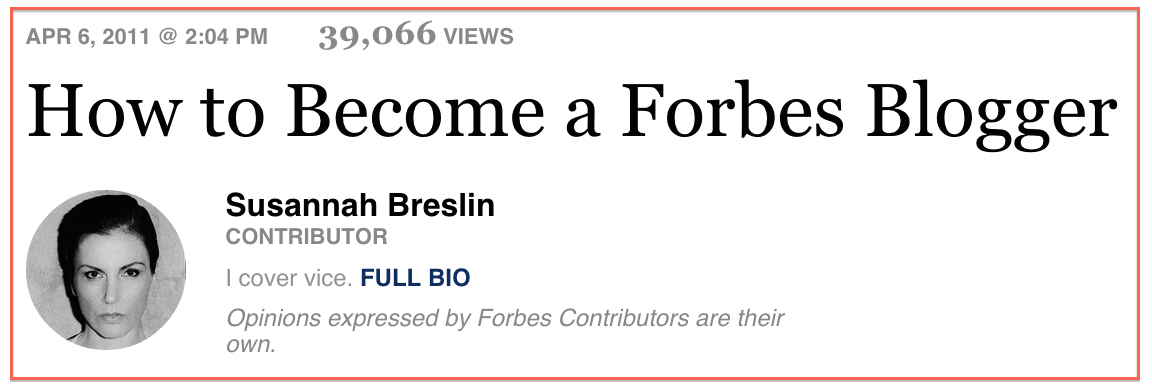Forbes will now pay all contributors. Will that improve “quality?”
 Forbes has a vast network of 1,500 contributors; only some are paid. The site announced it will now pay contributors $250 a month and drop the ones who are least popular. How will that affect quality? As it turns out, not much.
Forbes has a vast network of 1,500 contributors; only some are paid. The site announced it will now pay contributors $250 a month and drop the ones who are least popular. How will that affect quality? As it turns out, not much.
A bit of background: Just about anyone could get to be a Forbes contributor. Forbes never edits those contributor posts. (My cousin, the economist Len Burman, is a contributor; he once posted an April Fool’s satirical post that was fine with them until it reached the top of Google News and fooled a lot of people.) When you read a post on a site that says “Forbes” at the top, you expect the level of integrity that a traditional magazine creates, but when you read a post that says “Contributor,” that’s not what you’re getting. You have to pay close attention to notice the difference between articles by actual Forbes reporters and from contributors.
Why does Forbes bother? Traffic. A lot of traffic. Forbes.com now has 54 million monthly visitors. I’m betting a majority of those are landing on the contributor articles.
But in an era of fake news, unpaid, unedited contributors are a potential liability. So, as Randall Lane, Forbes’ Chief Content Officer, posted, Forbes is making changes. Some relevant parts of his announcement, titled “Why Forbes Is Investing Big Money In Its Contributor Network“:
[E]ffective immediately, every individual contributor will be on a paid contract, and those contracts will be uniform. The standard pay rates will not change from our current scale, which compensates these contributors for the loyal audience they build — incentivizing quality — rather than quick eyeballs. And we’ll now provide a larger, monthly $500 guarantee to those who post more regularly. This guarantee will work like a book advance — the money will be paid against those performance rates, and if the numbers come up short, the contributor still gets the guarantee, and we start with a clean slate the next month. We’ll also offer a $250 guarantee to those who post less regularly; give contributors who want to dial back further in any month the same ongoing guarantees in months they want to more fully engage . . .
In conjunction with these increased expenditures, which will bring in more talent, we’re redoubling our commitment to quality, and doing so systemically. The contributor platform empowers a diverse set of voices — experts and freelance journalists writing in their prescribed areas of mastery. . . . In tandem, we’ve institutionalized our version of the old Jack Welch maxim — we’ll review our roster regularly, and cut the bottom 10% annually, so that we’re continuously improving the quality and engagement with our readers.
Will this improve quality, or just traffic?
The Wall Street Journal’s article about this change has the title “Forbes Will Pay All of Its Contributors, but Purge the Worst.” But look at that headline, and the announcement, and you see an unspoken rule that has infected the media industry.
Traffic = Quality
When the Journal says Forbes will “purge the worst,” it means those with the least traffic. That’s also what Lane means when he talks about “the bottom 10%.” He says they are compensating contributors for “the loyal audiences they build” rather than “quick eyeballs.” But “loyal audiences” just means “eyeballs summed up over time.” It has nothing to do with quality.
If the conspiracy theorist Alex Jones were a Forbes contributor, he would have plenty of steady traffic — he’d probably be one of their top contributors. But what he said would remain untrue, unproven, and of questionable quality.
This change has nothing to do with truth. The posts will remain unedited. I’m sure Forbes will vet new contributors, making sure that what they write looks like journalism or analysis. But are we supposed to believe stuff like “5 Wellness Trends Set To Explode In 2018?” Or “Doctored Data, Not U.S. Temperatures, Set a Record This Year” by James Taylor, president of the Spark of Freedom Foundation? The point is not whether these articles are correct — it’s that there’s no way to know they are correct. Forbes’ contributors are responsible for fact-checking their own content, and Forbes is not going to do anything about what you post, no matter how outlandish, unless somebody complains after the fact.
Forbes is mixing journalism with blogging. This is not new — it’s the same at HuffPost, Axios, and all over the Web. But since Forbes started as a traditional media company, this intensely blurs the lines between journalism and random hoohah. This change will not stop fake news from appearing on Forbes.
It’s great that Forbes is now going to pay its contributors. But that has nothing to do with quality — it’s just about traffic. If you think those two concepts are equivalent, go work for the Daily Mail Online.
Interesting. I wonder if HuffPo is doing the same thing. The site recently killed its contributor program.
As for the message, I couldn’t agree more. The program rewards clicks more than “quality.”
Perlis took a company with 12 million EBITDA in 2012, created the Forbes Contributor network, got the traffic way up, and sold the property in 2014 for $415 million to the Chinese. (Integrated Whale). Did this move put the brand at long term risk? Yes. But will it pay off? Seems likely. I wouldn’t be surprised if this ends up with the Forbes family ultimately buying back the property and name at a fire sale, and making a big fuss about returning to premium journalism.